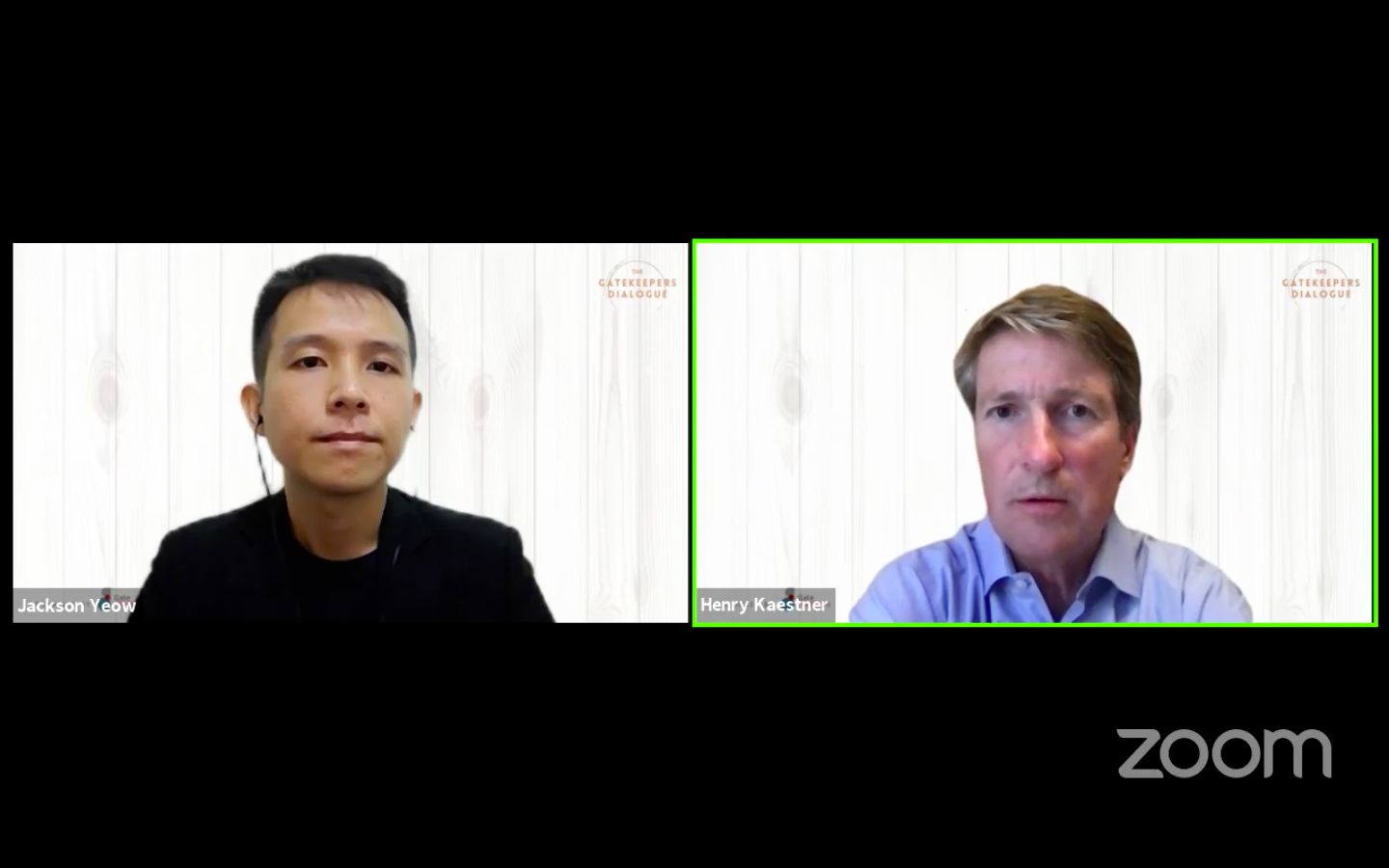“There is a way, through our investments, to bear witness to the King”: Being a faith-driven investor
In this series on The Gatekeepers Dialogue, Salt&Light interviews leaders who provide a biblical worldview of global issues that will be highlighted at the next World Economic Forum.
by Gracia Lee // August 17, 2021, 4:49 pm

There is a growing movement – the Faith-Driven Investing movement – that is seeing more Christian investors investing in businesses that can deliver, not just financial returns, but spiritual ones too, says Henry Kaestner, co-founder and partner at private equity and venture capital management company Sovereign’s Capital. Photo by Dean Drobot on Shutterstock.
What is your philosophy when it comes to investing for God’s Kingdom?
If you’re like most people, you probably would have the typical mindset of making as much money as you can through your investments, and then giving away that money to ministries.
But there has been a growing movement – the Faith-Driven Investing movement – that is seeing more Christian investors investing in businesses that can deliver – not just financial returns – but spiritual ones too.
This is what Henry Kaestner, co-founder and partner at Sovereign’s Capital, a private equity and venture capital management company, championed as he spoke on The Faith-Driven Investor at The Gatekeepers Dialogue on Thursday (August 12).
More Christian investors are investing in businesses that can deliver – not just financial returns – but spiritual ones too.
“You can invest in faith-driven entrepreneurs and they can deliver excellent financial results. But they can also be a winsome cultural witness as they are used by God to redeem and restore different segments of society, different industries,” he shared during the online two-day conference from his home in Silicon Valley.
Sovereign’s Capital invests in faith-driven entrepreneurs who seek to build their businesses on Kingdom values and serve their customers in a way that redeems and restores something that is broken the marketplace.
To date, it has raised some $130 million and invested in 60 companies in the United States and Southeast Asia, including ride-hailing service Grab.
“As we talk to our Abba Father, we pray that God’s Kingdom will come on earth as it is in heaven. There’s actually a way, through our investments, to bear witness to the King of whose Kingdom we pray to come as well,” he said.
Investing in God’s Kingdom
After co-founded Sovereign’s Capital, Kaestner saw that there was much more potential in championing faith-driven entrepreneurs and encouraging investors to journey with them.
Thus, he co-founded the Faith-Driven Entrepreneur and Faith-Driven Investor ministries, which seek to serve faith-driven investors, funds, partners, advisors and entrepreneurs through content and community.
“What does it look like for us to be able to be intentional about our faith as it manifests itself through our investment portfolio?”
He shared: “Over the last two and a half years, we found more than 60 funds that have some level of spiritual integration in what they do. We found hundreds and hundreds of direct investments.
“We found lots of communities and funds and endowments and foundations that, as a response to what’s going on in the ESG (economic, social and governance) world, are coming in and saying, what does it look like for us to be able to be intentional and winsome about our faith as it manifests itself through our investment portfolio?”
Of the few examples he cited, one was Ascend Partners, a $500 million fund which was set up by In Seon Hwang, former global head of healthcare at global private equity firm Warburg Pincus.
“He’s got a really well-thought spiritual integration plan, as he invested in physician practice management enterprises in the greater New York metropolitan area, many in impoverished neighbourhoods, understanding that when you’re loving on people through medicine, it’s a great opportunity to be able to share the reason for the hope that you have as well,” said Kaestner.
He stressed that the most important thing about this movement is ultimately not the plethora of investment opportunities available, but one’s heart posture.
“The most important thing is an opportunity to participate with Him in the work that He is doing.”
He said: “I believe that, as we look to invest the assets that God has started for us, the most important thing is an opportunity to participate with Him in the work that He is doing. What’s not so important is what fund we invest in. That’s important. But the most important thing is that we get down on our knees with our spouses and we ask God to direct us.
“This is a movement that is not prescriptive or presumptuous about what type of investing is best. The big win is if all Christ followers across all geographies and financial means understand that the assets, the investments and the philanthropic assets that God has entrusted them with can be used to glorify Him and to know Him, and to ask His wisdom and counsel about how to go ahead and invest it.”
Here are some of Kaestner’s answers to the investment-related questions posed by the audience at the conference.
Q: What do faith-driven investors look for when they invest with a faith-driven approach?
I think that there is an entire spectrum on financial returns that a Christ follower might look at as they seek to be faithful and obedient to what God calls them.
In many cases, the answer will be: “With this sum of money, I want you to get a market return.” I would suggest to you that it’s very possible to get a great market return not at the expense of biblical values, but because of it.

Kaestner (right) answering questions on the topic of The Faith-Driven Investor during the Q&A segment of The Gatekeepers Dialogue, moderated by Jackson Yeow.
But also, when you think about making investments in certain places in Asia and Sub-Saharan Africa, there’s a great opportunity of patient or concessionary capital that, by definition, provide a lower return because these are developing marketplaces that do not yet have generations of financial infrastructure, and also because there’s a real currency risk.
“When we as investors are looking to make investments in patient and concessionary capital … we need to look at excellence.”
And yet, when we make patient and concessionary investments in areas like that, we have the opportunity to extend a level of dignity as we invest in an ecosystem and become financial partners with people in Zimbabwe, Rwanda, Botswana, that brings them into the marketplace in a way that is completely different than philanthropic capital.
When we as investors are looking to make investments in patient and concessionary capital, which is only one section of the whole spectrum, we need to look at excellence.
What does that mean? I would submit to you that excellence is the ability of the person who is presenting the investment opportunity to us to deliver on it.
I’ll give you an example. If somebody came to me and said: “Hey listen, I want to get some debt capital from you. I’m going to be able to guarantee you back 3% in Singapore dollar terms, and we’ll also going to be able to impact 7,000 lives.”
I expect that, at the end of the year, they’ll deliver on what they said. I’ll get my 3% return. And you’ll say: “Wow 3% is much less than the 20% of risk capital.”
Yes. But I’ll expect the return and the impact that they said they were going to make, and that is what I would suggest is excellence – the ability for someone to deliver an excellent plan, talk about the problem they’re going to solve, how they’re going to execute on it and their ability to deliver on it.
Q: What does Sovereign’s Capital look for when considering faith-driven enterprises?
1. A man or a woman who wants to run their business for the glory of God
Some of them have a very well thought out workplace theology on that and have already shown how they’ve been able to incorporate that in their culture and how they’ve been able to love on their employees through initiatives like chaplaincy.
There are others whom we have invested in, where they come to us and say: “Look, I heard you exist. My Christian faith is very important to me. But I bet you that half of my employees don’t even know I’m a believer.
“I don’t know what it looks like to run my business for the glory of God, but I have an intentionality of doing it.”
We try to talk to people in their small group, we talk to their pastor, and ask: Is this someone who has a sincere Christian faith that really wants this intentionality, or are they just saying it?
2. A company that can articulate a redemptive story to what they do
That doesn’t mean that we invest in companies that just sell and provide shoes to people in Ecuador.
But it means that we look at companies like Grab. CEO Anthony Tan got started with this and the way he is able to bear credit to that when he talks about it to the press about his Christian faith is, I think, very impressive.
But I think this came about from an idea which was originally not-for-profit, which was: People can’t get rides at night in a safe way. How do we extend safety to the rider? How do we extend safety to the driver? It was seeing something that is broken in the marketplace and wanting to redeem it or restore it.
All the 60 companies we’ve invested in look to do the same.
3. An enterprise that seeks to delight their customer
I’m a firm believer that it is more cost effective to keep a customer on board at a company who was going to leave or churn, versus buying a new one.
Too many companies have an emphasis on growth and effectively buying customers. I don’t like that. I think that there’s such a thing as an optimal growth rate. Above that optimal growth rate and you start buying customers, you’re spending more and more for an additional customer, and that customer is least loyal, they’re most likely to churn and least likely to refer any other business.
So I instead like a company that can articulate how they endeavour to delight their customer and how they can give us information like churn by cohort, showing how they continually improve their customer service in such a way that their customers love them.
Q: What is the story of your most “miraculous” investment?
I have lots of favourite investments. But the story that I’ll share with you is as follows.
I met a young entrepreneur about four years ago who came to me and said: “I’m a product manager and, at some point in time, I’d love to be an entrepreneur.”
“Would you share your story with me?”
So we got together for breakfast and we hung out for about an hour.
About eight months later he came back to me and said: “Hey, I think I have got an opportunity for an investment.” It was to make a software that would help automobile shop owners.
I said: “That’s interesting. But tell me, what about God’s kingdom might change because you’re doing this? Think about it and if there’s something there and you want to process it with me, call me back.”
So he did, six months later.
He said: “I’ve been spending a lot of time thinking and praying about this. And you know, auto shop owners in America largely are not college educated, and they don’t understand software. And right now (accounting software) QuickBooks isn’t doing it for them and I think that I have an opportunity to love on them and to serve them.
“Instead of just looking to make a buck, he saw something that was broken and felt that God was calling him to redeem and restore it.”
“Furthermore, a lot of their customers are single moms who have one car. When their car breaks down, the most intimidating thing they’ll ever do is to go into an auto shop with a blown head gasket, not even knowing what a blown head gasket is, and then realising that they’re going to be without their car, and not really knowing how much it’s really worth – $200 or $1,000?
“I want to help solve that problem by creating a scholarship fund that, in partnership with these shop owners, will be able to love on these single women.”
I’m like: “Dude, you nailed it. That’s awesome.”
He told me that, in order for him to quit his job, he needed to raise $50,000. I said I’ll invest $15,000. And to make the long story short, I invested at one other level, but that turned into a 100x return.
And what’s neat about it is that he’s created a solution that is obviously valued in the marketplace at great scale. And some very deep-pocketed investors have come alongside to accelerate his growth.
But his DNA and his culture and the values that he set from the very beginning are God-honouring. Instead of just looking to make a buck, he saw something that was broken and felt that God was calling him to redeem and restore it and, in the process, love on these shop owners and love on these ultimate clients.
Q: What is your view on investing in borderline products such as tobacco and addictive gaming stocks?
Great question. There’s just so much there. Again, this movement needs to be characterised by heart posture and people being led by God as to where to invest.
Some people would say: “I only want to make an investment where people’s lives can be impacted in a way that shares the Gospel.” Other people would say: “I feel led by God through His Word to take care of creation.” And somebody would say: “I will never invest in a solar farm in the Nevada desert.” And somebody else will say: “That’s absolutely what I’m looking for.”
I don’t think that there is any pat answer, and yet I do think that there are some guidelines. I do think that we have an opportunity to be involved in the coming about and bringing about of God’s Kingdom on earth as it is in heaven, and that, as a Christ follower, we can use our investment capital to redeem and restore all things and to solve for brokenness.
“Lots of borderline questions. But my suggestion to you is you cannot go wrong if you submit all these decisions to God in prayer.”
With my own personal investments, I would stay away from some of the things that might be “borderline”. But not everybody will.
I’ll give you a good example. Sodas. A lot of people don’t like high-priced sugar water. But is it up to the consumer to understand how to get a modest Coca-Cola and not to drink the 64-ounce bottle but only to have the 7-ounce can?
One investor will look at that and say: “I can invest in that.” Another investor would say: “I don’t want to go anywhere near it.”
Now there are some clear things you don’t want to go anywhere near, like investing in adult entertainment. Pornography destroys families. It is unabashedly sinful. I would say that is not a borderline thing.
But some other people might say: “You know what? What about investing in somebody’s telecommunication stocks? Maybe they get 4% to 5% of their revenues from selling bandwidth to some of those providers.”
So what is the right type of tolerance on something like that? Well again, that’s where a Christ follower needs to be led by how God is speaking to them.
So, lots of borderline questions. But my suggestion to you is you cannot go wrong if you submit all these decisions to God in prayer.
Q: Should Christians actively refrain from the current trend of meme stocks and speculation?
Meme stocks, bitcoin, other things. There’s quite a conversation about investing in precious metals and in cryptocurrency as assets that would appreciate and as a hedge against inflation.
“Instead of thinking about a hedge against inflation, we should think about a hedge against Judgement Day.”
And I submit an imperfect response to that.
I suggest that, instead of thinking about a hedge against inflation, we should think about a hedge against Judgement Day, where God says: “How did you invest the things that I entrusted you with?”
With so many different opportunities to invest in investment vehicles that can have a spiritual integration, where somebody can come to understand that there’s a God who loves them through what that investment does with excellence, why would we want to go ahead and have money to speculate on the price of bitcoin?
However, I need to tell you that, while I don’t see a lot of spiritual integration in gold, somebody did say to me: “Well, you need to understand that some of these other assets need to be reserve currencies so that in two months’ time, three months’ time, when you see another investment that comes to you that you want to jump into, and everything else is locked up, you need to be able to liquidate something like gold.”
And they may very well have a very good point on that.
But my comments are more towards the memes and NFTs and things like that. That time of speculation feels to me like the Tulip Bulb deal in the Netherlands 400 years ago. And it feels to me that it is dangerous ground.
Really, you miss out on an opportunity to participate in the work that God is doing in great companies that are led by Christ followers.
Q: Should we invest in good, non-Christian entrepreneurs who impact society positively?
The answer is: Absolutely. I think there is incredible spiritual integration in that.
We don’t do that at Sovereign’s just because we started life off believing that a Christ-following entrepreneur was a pure play on loving their partner, vendor, customer and employee in a way that evidenced God.
That’s where we feel God called us.
But don’t let anybody who is attending this conference for a second think that, in order to do faith-driven investing, you have to invest only in Christian-led companies.
I know so many funds that can invest in anything and look to have those relationships with CEOs as an opportunity to witness to them.
The Gatekeepers Dialogue, organised by Gatekeepers (Singapore), brings together Christian leaders across disciplines from different nations as an ekklesia to discern, share and address contemporary Environment, Social, and Governance (ESG) issues from a Biblical context.
MORE FROM THE GATEKEEPERS DIALOGUE:
We are an independent, non-profit organisation that relies on the generosity of our readers, such as yourself, to continue serving the kingdom. Every dollar donated goes directly back into our editorial coverage.
Would you consider partnering with us in our kingdom work by supporting us financially, either as a one-off donation, or a recurring pledge?
Support Salt&Light



